January 2, 2025 | 09:03 GMT +7
January 2, 2025 | 09:03 GMT +7
Hotline: 0913.378.918
January 2, 2025 | 09:03 GMT +7
Hotline: 0913.378.918
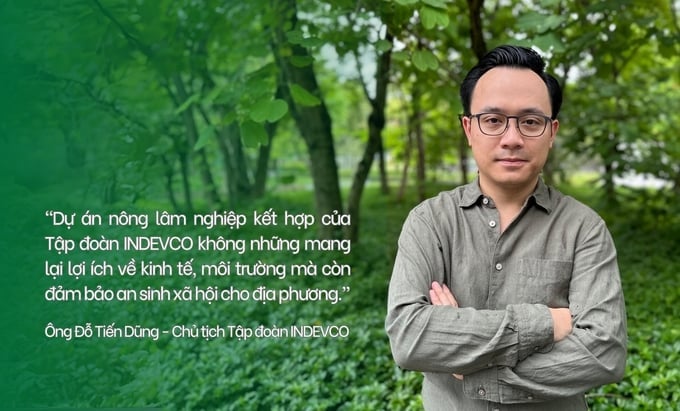
Do Tien Dung, Chairman of INDEVCO Group. Photo: Cuong Vu.
Do Tien Dung, Chairman of INDEVCO Group, is deeply concerned about the sustainable revival of the acacia forest. Chairman Dung noted that acacia, a fast-growing species, helps improve microclimates and soil, reduces runoff, and fixes atmospheric nitrogen in the soil. However, the reliance on monoculture over many years has negatively impacted the region's biodiversity and resulted in low economic returns.
In response to these challenges, the Chairman of INDEVCO Group has developed a plan to enhance the economic efficiency of planted forests. Integrating agriculture and forestry is one of the most effective solutions to maximize land use, conserve soil, and foster sustainable development in addition to addressing global challenges such as food security and climate change.
With its existing advantages, INDEVCO aims to improve the economic efficiency of planted forests by adopting cultivation methods and plant species suitable for the soil and climate conditions of Quang Ninh province. Additionally, the group plans to gradually transition from small timber forests to large timber forests, cultivate medicinal plants under the forest canopy in combination with livestock farming. INDEVCO currently owns over 400 hectares of land in the communes of Vu Oai and Hoa Binh in Ha Long city, Quang Ninh province. The majority of this land area is covered with over-mature acacia trees.
"INDEVCO Group will implement an integrated crop and livestock farming model, with an emphasis on circular economy, and utilizing agricultural by-products as animal feed. Accordingly, livestock waste will be used as organic fertilizer for crops, thereby reducing input costs and increasing production value. Additionally, homegrown medicinal herbs can be used as animal feed to boost the livestock's immune system," Chairman Dung discussed his company's plan.
Following implementation, Chairman Dung expects the model to develop into a circular agricultural ecosystem that integrates crop and livestock farming, minimizes waste and environmental impact, boosts productivity, and condenses the supply chain.
As a continuous demonstration of social responsibility, INDEVCO Group is dedicated to implementing economic development projects that support local livelihoods. As a result, the plan to invest in an integrated agroforestry model on 400 hectares in Vu Oai and Hoa Binh communes offers both economic and environmental benefits. Moreover, the model promotes social welfare for the local community.
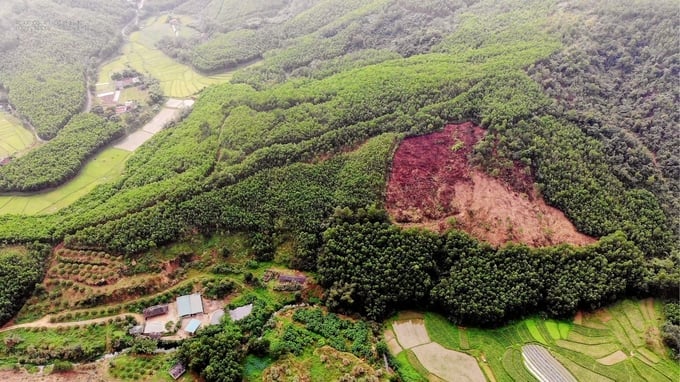
The 400-hectare land is located between the boundaries of two projects: An Lac Memorial Park and the Solid Waste Treatment Center in Vu Oai and Hoa Binh communes, owned by INDEVCO Group. Photo: Cuong Vu.
According to Chairman Dung, the agroforestry model will yield economic profits several times higher than the current monoculture of small timber trees. In addition to economic development, INDEVCO's agroforestry model has the capacity to store a significant amount of carbon in the soil and plant biomass, thereby reducing emissions and absorbing greenhouse gases. This initiative contributes to Vietnam's goal of achieving net-zero emissions by 2050.
With the principle of utilizing nature as a foundation and placing humans at the heart of sustainable economic development, INDEVCO Group hopes that Quang Ninh province will facilitate the investment plan for the integrated agroforestry model that aims to revive the company's 400-hectare forest area.
Quang Ninh province has shifted its focus towards developing large timber forests in recent years, which provide high economic benefits, contribute to environmental protection, and address climate change. The province aims to plant nearly 12,900 hectares of large timber forests by 2025, including nearly 9,000 hectares of new forests and 3,800 hectares of converted forests.
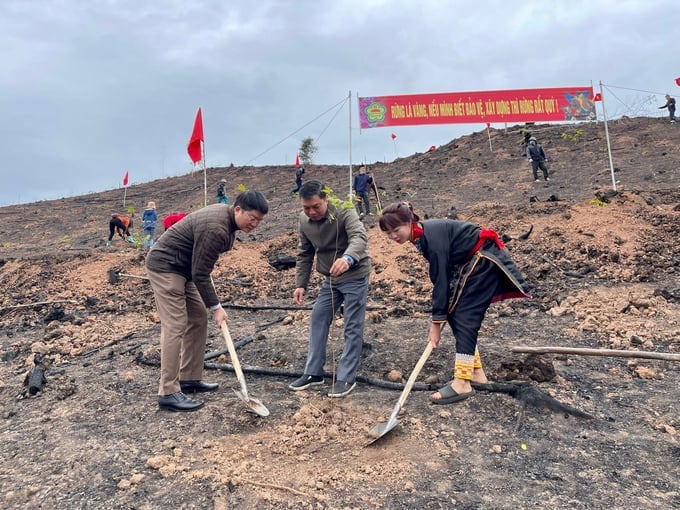
Despite their relatively short production cycle, acacia trees offer limited economic efficiency. Multiple households in Quang Ninh province have recently shifted towards planting large timber trees. Photo: Cuong Vu.
Nguyen Minh Son, General Director of Quang Ninh province's Department of Agriculture and Rural Development, affirmed that sustainable forestry development is indispensable for the development of tourism, services, green economy; environmental protection; and ensuring national defense and security. Consequently, forestry development must encompass afforestation; forest rehabilitation, management, protection, and development; logical, economical, and sustainable use of forest resources, as well as the exploitation, processing of forest products; forest environmental services; and eco-tourism. The sector's development trajectory must follow the province's rapid and sustainable socio-economic development orientation.
According to General Director Son, Quang Ninh aims to increase the average annual production value from forests by 8%, with a growth rate of approximately 5.5% per year. The productivity of planted forests is expected to rise from the current 10 cubic meters per hectare to 15 cubic meters per hectare between 2022 and 2025. The average annual harvest yield of planted timber is projected to reach 400,000 cubic meters; and the average annual harvest yield of non-timber forest products, including medicinal plants, is expected to increase from 3,500 tons to 4,000 tons between 2022 and 2025.
"Between 2021 and 2023, Quang Ninh province has allocated 240 billion VND, through the Social Policy Bank, to local ethnic minorities and residents in mountainous, border, and island areas for production development, income enhancement, and livelihood stabilization," General Director Son shared.
Quang Ninh province aims to plant 5,000 hectares of ironwood and magnolia forests by 2025, with 50% of mountainous households and ethnic minorities in forested areas participating in commercial forestry production. This initiative is expected to provide employment for between 60,000 and 70,000 people, with an average income of 6,000,000 VND per person per month.
Translated by Nguyen Hai Long
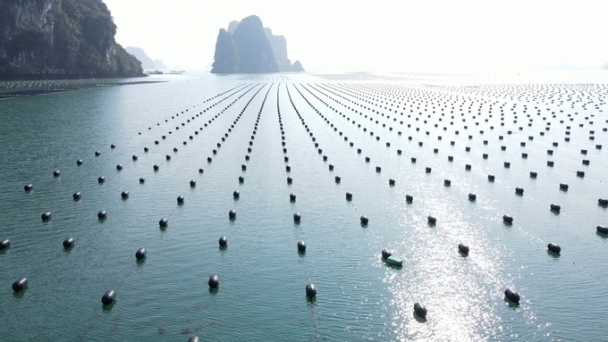
(VAN) Deputy Minister of Agriculture and Rural Development Phung Duc Tien emphasized this at the conference on ‘Development of mollusk and seaweed production’ held on the morning of December 26 in Nam Dinh.
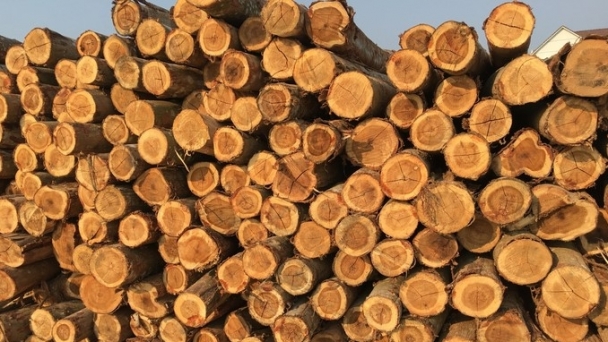
(VAN) Small planted forest timber is currently priced at 1.5 million VND/ton; large timber is priced at up to 1.8 million VND/ton; large timber with FSC certification is priced 20-30% higher than normal large timber.
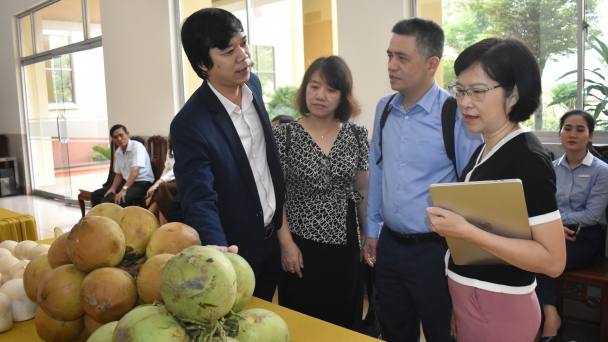
(VAN) The Vietnam Coconut Association has noted that the water coconut industry is thriving in Vietnam. Nevertheless, its development is still uneven, suggesting that there is a substantial untapped opportunity to attract foreign investors.
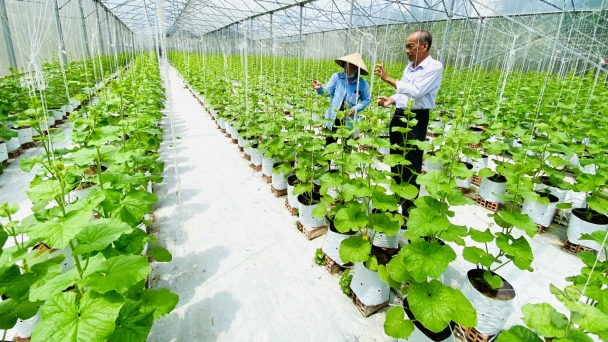
(VAN) According to the development plan for Can Tho in the 2021-2030 period, with a vision for 2045, the city will establish 7 high-tech agricultural zones and 2 concentrated livestock breeding areas.
/2024/12/17/1117-0-nongnghiep-231112.jpg)
(VAN) Spirulina products of a young girl in Da Nang city are currently not only present in many major provinces and cities in the country but also exported.
/2024/12/17/5810-1-194622_403.jpg)
(VAN) From a seemingly worthless waste product, cassava residue in Tay Ninh has become an important source of revenue for starch processing enterprises.
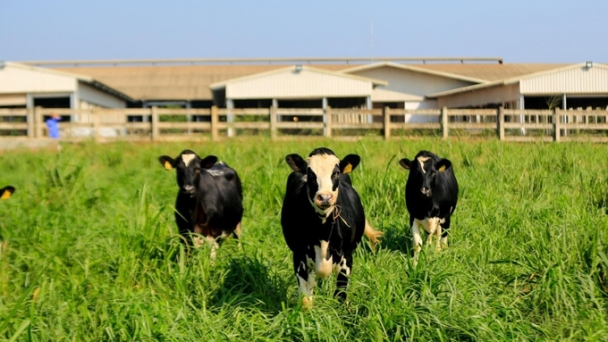
(VAN) The cattle herd at TH organic dairy farm enjoys an antibiotic-free diet of certified organic feed and exposure to sunlight that boosts their physical activity and natural immunity.